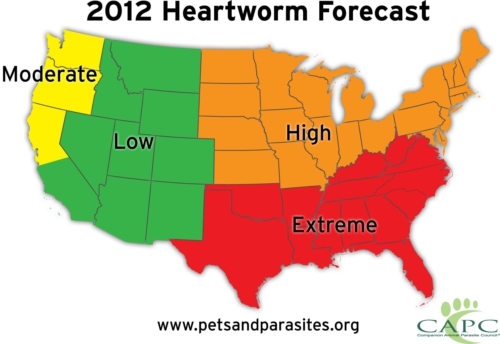Leading parasitologists with the nonprofit Companion Animal Parasite Council have developed a first-of-its-kind forecast that predicts the prevalence of certain parasites in upcoming seasons. The Spring 2012 CAPC Parasite Forecast focuses on heartworm, a potentially fatal disease in dogs and cats transmitted via mosquito bites, and warns that most of the country will experience high populations of the troublesome parasite in the coming months.
“The CAPC is proud to provide the Parasite Forecast as a public service,” said Byron Blagburn, MS, Ph.D., parasitologist, CAPC board member, former CAPC president and distinguished professor at the Auburn University College of Veterinary Medicine in Auburn, Ala. Blagburn – one of fewer than a dozen veterinary parasitologists in the country who specializes in heartworms – was instrumental in the data analysis for and compilation of the CAPC Parasite Forecast. “We want everyone to be especially vigilant in protecting themselves and their pets from the risks that parasites pose in every state in the country. It’s important to remember that almost all parasites are completely preventable.”
Even so, data shows that roughly half of the more than 78 million pet dogs in the United States are unprotected against heartworms – parasites that can be prevented with year-round, easy-to-administer medication. The CAPC hopes its Parasite Forecast will remind pet owners to have their animals examined annually by a veterinarian and give their pets preventives that eliminate the risk of infection by heartworms and other parasites.
Through April 2012, it calls for the following levels of heartworm populations in five U.S. regions*: “extremely high” in the South; “high” in the Northeast and Midwest; “moderate to higher-than-normal” in the Northwest; and “persistent spikes” in parts of the West.
The CAPC based its Forecast on National Weather Service data, weather trends, parasite prevalence statistics from veterinary clinics and animal shelters across the country. The forecast is also the collective expert opinion of respected parasitologists, who engage in ongoing research and data interpretation to better understand and monitor disease transmission and changing life cycles. This fall, the CAPC will issue another Parasite Forecast that covers heartworm and ticks.
The key indicators that point to increased numbers of heartworms this spring are anticipated above-normal temperatures and precipitation amounts, because mosquitoes thrive in wet, warm climates. While there are medications available to treat heartworm disease, they are costly and often ineffective. Prevention is the best defense against heartworms, which rarely also affect humans.
To protect pets and families from parasites and parasitic disease, the CAPC recommends that all pet owners administer parasite control medication to dogs and cats year-round. Many parasite prevention products require a simple monthly application. Regular veterinarian checkups are also important so that pets may be tested and treated for any external or internal parasites that doctors find.
Related:Heartworm Medication Shortage has Pet Owners Concerned

